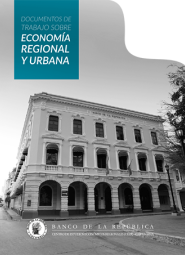Evaluating the Impact of Macroprudential Policies in Colombia's Credit Growth
La serie Borradores de Economía es una publicación de la Subgerencia de Estudios Económicos del Banco de la República. Los trabajos son de carácter provisional, las opiniones y posibles errores son responsabilidad exclusiva del autor y sus contenidos no comprometen al Banco de la República ni a su Junta Directiva.
Macroprudential tools have been used around the world as a mechanism to control potential risks and imbalances in the financial sector. Colombia is a good example of a country that has employed different regulatory measures to manage systemic risks in the economy. The purpose of this paper is to evaluate the effectiveness of two policies employed in said country to increase the resilience of the system and to moderate exuberance in credit supply. The first measure, the countercyclical reserve requirement, was implemented in 2007 to control excessive credit growth. The second tool corresponds to the dynamic provisioning scheme for commercial loans, whose objective was to consolidate a countercyclical buffer through loan loss provision requirements. To perform this analysis a rich data set based on loan-by-loan information for Colombian banks during the period between 2006 and 2009 is used. A fixed effects panel model is estimated using debtors', banks' and macroeconomic characteristics as control variables. In addition, a difference in differences estimation is performed to evaluate the impact of the aforementioned policies. Findings suggest that dynamic provisions and the countercyclical reserve requirement had a negative effect on credit growth, and that said effect differs conditioned on bank-specific characteristics. Results also suggest that the aggregate macroprudential policy stance in Colombia has worked as an effective stabilizer of credit cycles, with some preliminary evidence also pointing towards significant effects in reducing bank risk-taking. Moreover, evidence is found that macroprudential policies have worked as a complement of monetary policy, accompanying the stabilizing effects of changes in interest rates on credit growth.
The series Borradores de Economía is published by the Economic Studies Department at the Banco de la República (Central Bank of Colombia). The works published are provisional, and their authors are fully responsible for the opinions expressed in them, as well as for possible mistakes. The opinions expressed herein are those of the authors and do not necessarily reflect the views of Banco de la República or its Board of Directors.





















































